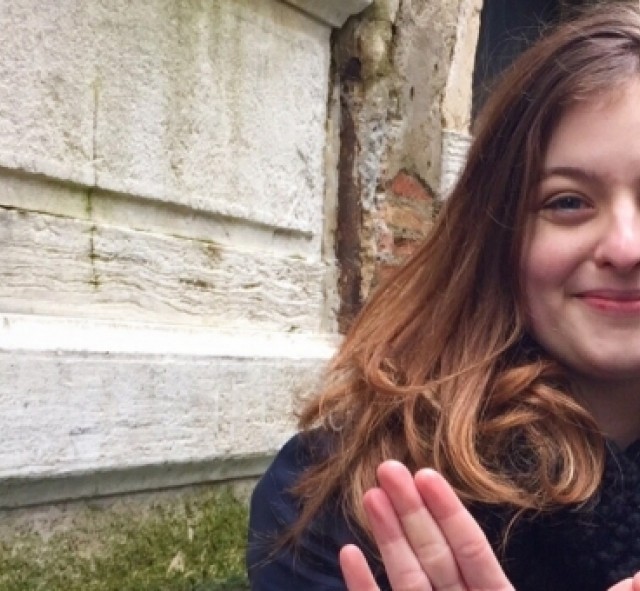Danielle Hurley, class of 2019, chose to attend Wittenberg because of its archaeology program. She is now turning the extensive opportunities into action as she participates in the Ferrycarrig excavation in Ireland this month.
“Wittenberg is one of the few schools that actually offers an archaeology program, and once I visited my senior year of high school and realized that, I was hooked,” said Hurley, a Defiance, Ohio, native and major in history with minors in archaeology and pre-modern and ancient world studies.
“Archaeology has always fascinated me, and I have always loved history,” she said. “Wittenberg’s history department is superb, and I cannot imagine being taught by anyone else. I love the history department faculty and staff, and the support and dedication they show their students makes it worthwhile.”
While in Ireland, Hurley is staying with a local family in the county of Wexford and will be part of the dig studying the first Norman fortifications in Ireland (Ireland: Ferrycarrig). The program is sponsored by the Institute for Field Research (IFR), an organization created to bring archaeological field schools to students. Ferrycarrig is located within the Irish National Heritage Park, an open-air museum recreating key stages in the country’s past.
“Ferrycarrig is one of the first permanent Norman fortifications in Ireland,” said Hurley, who began her program July 1. “The site was home to a ringwork castle built by Sir Robert Fitzstephen in 1169 CE for strategic purposes. Today, all that remains is a ditch and bank above ground signifying the need for further archaeological excavation.”
Hurley said that significant research was done in the 1980s, but “there has not been much work done since then.” The goal of the project is to document two periods of site occupation - the original ringwork erected by Fitzstephen and a later medieval stone castle built on top of the remains of the original castle around 1857 CE.
“The program not only teaches basic archaeological skills, but also other skills that are useful in the field. It will enhance my skills as a historian and archaeologist by providing new skills, insights and experiences that will allow me to grow as a person,” said Hurley, a member of the University Honors Program, the Honor Society Alpha Lambda Delta and an editor of the Wittenberg History Journal.
“Furthermore, this experience could potentially be tied into my senior honors thesis in the spring in one way or another.”
The program focuses on artifact curation and conservation, which aligns with Hurley’s career goal of working in a museum. The field school is significant to her educational goals, too, as it will provide such skills as survey and excavation, experimental archaeology, recording and archaeological drawing, as well as learning the proper laboratory protocols surrounding the cataloging of artifacts for her archaeology minor.
“Additionally, the site is unique because it is within an open-air museum, the largest one in Ireland,” she said. “This is awe-inspiring since I love museums and the fact that this is one of the largest open-air museums in Ireland is impressive. The experience of handling and conserving artifacts will help in the future if I assist in curating artifacts in a museum. Participating in this field school will also provide me with a culturally enriching experience and help introduce me not only to fieldwork more in-depth but also introduce me to the Irish culture and lifestyle since I will be staying with local families for the duration of the field school.”
This study-abroad opportunity was made possible for Hurley through the Nancy L. Benco Archaeological Research Fund award. She is one of three students to receive the award to help with expenses. Paige Narciso, class of 2019, and Abigail Fraker, class of 2018, were also recipients.
The scholarship was created by Dr. Nancy L. Benco, Wittenberg class of 1966 and a professional archaeologist, to help fund history majors and minors who wish to study archaeology and the human past. The purpose of the fund is to provide financial assistance to the Wittenberg history department and archaeology program to promote the study and appreciation of archaeology at the university through student research, fieldwork and learning experiences for undergraduates interested in the human past around the globe. Learn more about the fund here.
“I won the Nancy Benco Award and the Hartje Scholar Award to study abroad, and without them my trip would not be possible,” Hurley said. “Wittenberg's generous alumni and the history department have allowed this opportunity to become a reality and for that I am extremely grateful and thankful for their support. I think it is wonderful that the Wittenberg history department has such amazing opportunities for students wishing to study abroad. I was overjoyed to hear I won both scholarships. Even now, I cannot wrap my head around the fact that I am in Ireland this summer to work on an Anglo-Norman site."
The Harjte Scholar Award is for students who seek to study abroad and is part of the Martha and Robert G. Harjte Fund. Each Hartje Scholar can be awarded a maximum of $1,500 to assist in travel for international educational experiences. Zoë Schwartz, class of 2020, is also a recipient. She will be traveling to Germany for the entire 2019-2020 academic year.
“Wittenberg continues to have 100 percent success in acceptance of our students into the IFR programs,” said Darlene Brooks Hedstrom, the Kenneth E. Wray Chair in the Humanities, professor and chair of history, and director of archaeology at Wittenberg. “Our Archaeology program has had great success with the Ireland IFR programs. Both Caitlin Lobl ’16 and Hannah McCartney ’18 participated in programs there and encouraged other students to apply. Danni was impressed by what they learned on site, the tours to other archaeological sites, and the experience to learn about the various opportunities with post-excavation work. Since she wants to gain hands-on-experience with objects, this project will give her a competitive advantage when applying for graduate school.”






